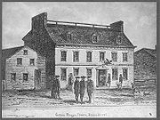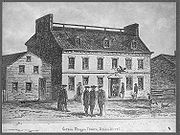
Green Dragon Tavern
Encyclopedia

Public house
A public house, informally known as a pub, is a drinking establishment fundamental to the culture of Britain, Ireland, Australia and New Zealand. There are approximately 53,500 public houses in the United Kingdom. This number has been declining every year, so that nearly half of the smaller...
used as a tavern
Tavern
A tavern is a place of business where people gather to drink alcoholic beverages and be served food, and in some cases, where travelers receive lodging....
and meeting place located on Union Street
Union Street (Boston, Massachusetts)
Union Street is a street in Boston, Massachusetts, near Faneuil Hall and the North End. Prior to 1828, it was also called Green Dragon Lane.-See also:* First Baptist Church * James Franklin * Green Dragon Tavern...
in Boston
Boston
Boston is the capital of and largest city in Massachusetts, and is one of the oldest cities in the United States. The largest city in New England, Boston is regarded as the unofficial "Capital of New England" for its economic and cultural impact on the entire New England region. The city proper had...
's North End.
A petition for a license to sell "strong drink" at the Green Dragon was presented in 1714. The property had been inherited by Mehitable Cooper from her father, William Stoughton
William Stoughton (Massachusetts)
William Stoughton was a colonial magistrate and admininstrator in the Province of Massachusetts Bay. He was in charge of what have come to be known as the Salem Witch Trials, first as the Chief Justice of the Special Court of Oyer and Terminer in 1692, and then as the Chief Justice of the...
, in 1701. The Green Dragon Tavern was purchased from her son, William Cooper, by William Douglas
William Douglass (physician)
William Douglass was a physician in 18th-century Boston, Massachusetts, who wrote pamphlets on medicine, economics and politics that were often polemical.-Personal life:...
, physician and pamphleteer
Pamphleteer
A pamphleteer is a historical term for someone who creates or distributes pamphlets. Pamphlets were used to broadcast the writer's opinions on an issue, for example, in order to get people to vote for their favorite politician or to articulate a particular political ideology.A famous pamphleteer...
, in 1743. Douglas lived in the tavern, calling it his "mansion house". After his death in 1752, the tavern passed to his sister, who sold it to the St. Andrews Lodge of Freemasons in 1766. The Freemasons used the first floor for their meeting rooms. The basement tavern was used by several secret groups and became known by historians as the "Headquarters of the Revolution". The Sons of Liberty
Sons of Liberty
The Sons of Liberty were a political group made up of American patriots that originated in the pre-independence North American British colonies. The group was formed to protect the rights of the colonists from the usurpations by the British government after 1766...
, Boston Committee of Correspondence
Committee of correspondence
The Committees of Correspondence were shadow governments organized by the Patriot leaders of the Thirteen Colonies on the eve of American Revolution. They coordinated responses to Britain and shared their plans; by 1773 they had emerged as shadow governments, superseding the colonial legislature...
and the North End Caucus each met there. The Boston Tea Party
Boston Tea Party
The Boston Tea Party was a direct action by colonists in Boston, a town in the British colony of Massachusetts, against the British government and the monopolistic East India Company that controlled all the tea imported into the colonies...
was planned there and Paul Revere
Paul Revere
Paul Revere was an American silversmith and a patriot in the American Revolution. He is most famous for alerting Colonial militia of approaching British forces before the battles of Lexington and Concord, as dramatized in Henry Wadsworth Longfellow's poem, Paul Revere's Ride...
was sent from there to Lexington on his famous ride. In January 1788, a meeting of the mechanics and artisans of Boston passed a series of resolutions urging the importance of adopting the Federal Constitution pending at the time before a convention of delegates from around Massachusetts. The building was demolished in 1854.
The current Green Dragon Tavern is located on 11 Marshall Street in Boston's North End. Its publicity states that it is the "headquarters of the revolution", though its relationship to the demolished original pub is not immediately apparent.

